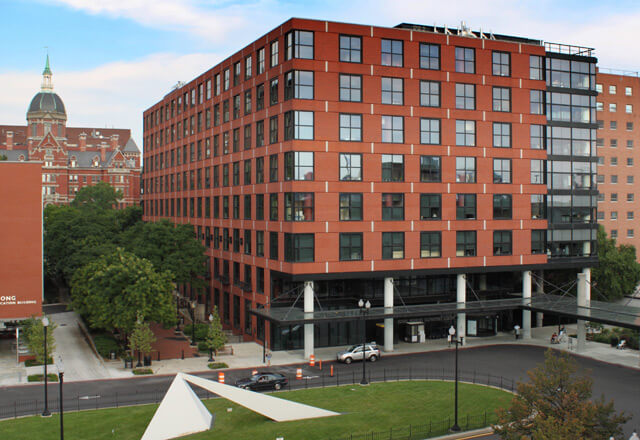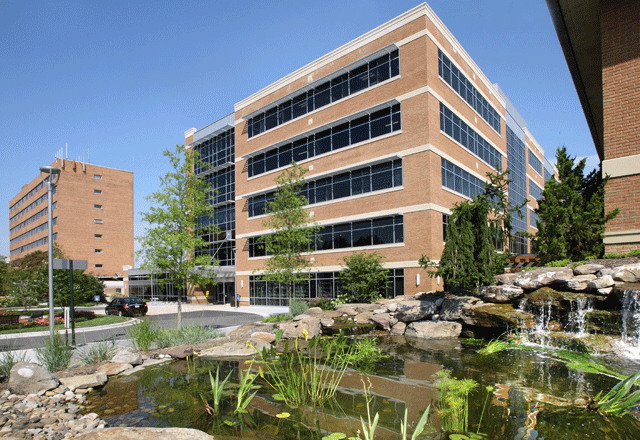The Johns Hopkins Comprehensive Hernia Center offers world-class hernia repair procedures in the Baltimore and Washington, D.C. areas. Our multidisciplinary group of hernia specialists uses a wide variety of surgical techniques to provide individualized care for our patients, including referral patients whose complicated conditions cannot be treated elsewhere.
Why Choose Johns Hopkins for Hernia Care?
Multidisciplinary Team

Individualized Care

Commitment to Excellence

Conditions We Treat
- Hiatal hernias
- Incisional hernias
- Inguinal hernias
- Parastomal hernias
- Sliding hiatal and paraesophageal hiatal hernia
- Sports hernias
- Umbilical hernias
- Ventral hernias
If you experience any of the above symptoms of a strangulated hernia, contact your primary care provider as soon as symptoms occur. If you cannot contact your primary care provider, go to the closest emergency room.
Learn More About Hernias
Repairing a Hernia with Surgery
Hiatal Hernia Repair FAQ
Ventral Hernia Repair
What to Expect from Your Hernia Surgery
We want to make sure you’re prepared for your procedure. This guide will help you along the way.
Preparing for Surgery
-
After you make an appointment, you will be scheduled for a meeting with team members who can answer your questions and lay out a plan of action to provide you with the safest procedure possible. Things you will want to keep in mind or write down before this meeting:
- Your symptoms. How long have you had discomfort, and have your symptoms changed or worsened recently?
- Your medical information. Are you on any medication? Do you have any other diagnosed conditions? Include any nonsteroidal anti-inflammatory medication (NSAID) that you currently take, even aspirin or ibuprofen.
- Questions for us. Although we’re happy to answer questions at any time, writing your questions down will keep you from forgetting to ask anything important during the meeting and allow us to answer your questions right away.
-
Once you’ve met with our team and made any necessary changes to lower your risk of complications from surgery, you will need to see your primary care provider for a pre-operation physical. Physicals may differ depending on the patient and type of surgery, but all will ensure your overall well-being and check for undetected conditions that could make surgery inadvisable.
-
Before surgery, make sure to follow any pre-appointment restrictions set by your hernia team such as avoiding nonsteroidal anti-inflammatory medications (NSAIDs) like aspirin and ibuprofen for a week before surgery and not eating the day of surgery. Try to get a good night’s sleep, and if your procedure requires a hospital stay, make sure to bring anything you will need during that time.
Treatment Options
-
Laparoscopic, or minimally invasive, procedures use multiple small incisions no more than 1 centimeter in length to access the hernia. The abdomen is then inflated with carbon dioxide to provide room for the surgeon to work, and the hernia is repaired with a small, flexible device called a laparoscope. Mesh is sometimes required to secure and reinforce the hernia. This procedure requires a hernia specialist comfortable with minimally invasive techniques and typically produces less scarring and postoperative pain, reduced risk of wound infection, shorter postoperative hospital stay length and a faster return to normal activities. With a skilled surgeon, the risks of complications or recurrence are approximately the same as an open procedure. However, not all patients will be candidates for minimally invasive procedures, including patients with large hernias or adhesions from prior abdominal surgery.
-
Open procedures use a single incision to open the abdomen and access the hernia, after which the hernia is repaired using mesh. Open procedures are ideally suited for patients with large or multiple hernias. Patients who have had prior abdominal surgery are also good candidates for open procedures, as scar tissue in the abdomen forms adhesions that can make minimally invasive operations difficult or even dangerous.
-
Abdominal wall reconstruction repairs defects in the abdominal walls while reducing abdominal tension and providing structural support. This may require a component separation to be performed so that the muscle edges of the hernia gap can be brought back together again.
-
Mesh is often used to help strengthen the hernia repair and reduce the risk of recurrence. The surgeons of the Comprehensive Hernia Center use specialized mesh that is designed to improve the outcomes of the hernia repair. As each case is different, your surgery may not require the use of mesh. If you have questions about mesh and its use, please ask your surgeon.
After Surgery
-
Recovery time after surgery depends on the type of hernia you have and the type of procedure required. Patients who undergo minimally invasive surgery are usually able to go home the same day and are able to walk the night of the surgery. Some patients, especially those who have had abdominal wall reconstructions or component separations, may have to stay in the hospital for a few days.
-
Discomfort is typically handled with over-the-counter medication, although some patients may require a combination of over-the-counter and opioid-based medication.
-
All patients need a follow-up appointment two weeks after surgery to ensure that their pain is well controlled and there are no infections. Patients with more complex procedures may have complex bandages or negative pressure dressings that need evaluation, and we need to ensure that any surgical drains are performing properly to avoid infection. Depending on the patient’s progress, a second follow-up appointment may be necessary.
-
After surgery, most patients will be asked to avoid lifting anything heavier than 15 pounds for the first two weeks, though more complicated patients may have differing limitations. Different patients will have individual restrictions, but in general, you should be as active as your provider permits. If you have any questions or health concerns after your surgery, contact your provider right away.
-
Advances in technology and medical knowledge have lowered the risk of complications after hernia surgery substantially, and our experts use the latest practices and equipment to provide the safest procedures possible. However, there is still a chance of recurrence or infection after surgery. Obesity and smoking increase these risks substantially, and many hernia experts will require patients to lose weight and commit to smoking cessation before surgery, unless tissue is incarcerated or strangulated. Additionally, activities that increase intra-abdominal pressure at the hernia repair site should be avoided, as even a persistent cough or constipation can increase the risk of recurrence. Chronic pain is also a risk. Although most pain will go away with conservative management, in rare cases, further surgery may be necessary to alleviate the pain. A healthy lifestyle with regular exercise and regular checkups with your primary care provider will also help reduce the risks involved with any surgery.
Locations
Johns Hopkins Bayview Medical Center
4940 Eastern Ave
Baltimore, MD 21224

Levi Watkins, Jr, MD, Outpatient Center
601 N. Caroline St
Baltimore, MD 21287

Sibley Memorial Hospital
5255 Loughboro Rd, NW
Washington, DC 20016





